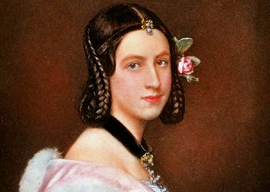
March 02, 2018

Lady Jane Erskine
Source: Joseph Karl Stieler
The aristocracy played little role in England’s revival at the hands of a grocer’s daughter from the Midlands. Bristling at the idea that a country that had “defeated one half of Europe and saved the other” should now be considered the sick man of Europe, Margaret Thatcher forced Britain to be itself again, rolling back the damage of successive Labour and Tory governments. Of course, this meritocratic liberal was an anathema to comfortable upper-class declinism. Instead of gripping the new boom as they had once gripped the Industrial Revolution, our heroes found a passive means of profit. This was the Lloyd’s Syndicate, which meant posting their assets as collateral for insurance policies. After all, no one would really take the Canaletto from the place it had occupied for 200 years? A wave of U.S. asbestos claims proved otherwise. Never missing an opportunity to miss an opportunity, the aristos had managed to lose money as everyone around them got rich.
How could a species that once steered Britain to greatness now claim the Darwin Award in every passing decade? The simple reason is that British aristocrats are the only people on earth among whom stupidity is not only accepted but prized. As the ultimate proof against meritocracy, it is the ultimate badge of honor. As Stendhal wrote in Le Rouge et Le Noir, “It is not doing something well or badly that is the crime: but doing it at all.” As such, two things have assisted the distillation of stupidity among Britain’s upper class. One is its very permeability. If a family did well in Britain, it could expect a title. This meant its energies would be dissipated aping—and hence validating—the aristocratic lifestyle (rather than becoming focused in the somewhat more virile manner of the French bourgeoisie). Related to this is a second factor: peace. The British nobility has never been tested on its own ground, unlike the nobilities of Europe. When Patrick Leigh Fermor walked to Istanbul in 1933, he found vibrant aristocracies a world away from the decadence of Britain.
This vibrancy is still present in Europe. Tested by war and revolution—and without the wealth distortion of an empire—European aristos learned to think hard and work hard as well as play hard. They are much better company as a result. I am reminded of a certain German count who—already flying drunk by the main course—abruptly declared to his hostess, a cousin twenty years his senior: “You have eyes like a doe. I would like to fuck you.” He was later found shoeless in the snow, several miles away. But on Monday he got up and went to work. He understood the truth of Lampedusa’s simple admonition: For everything to remain the same, everything must change. Britain’s nobles tried to change nothing—and now everything has changed. They have only themselves to blame.